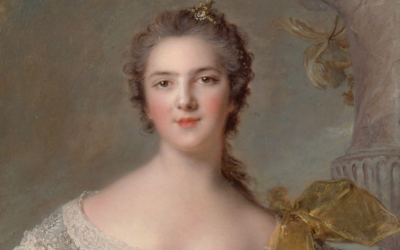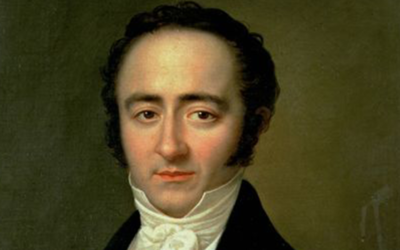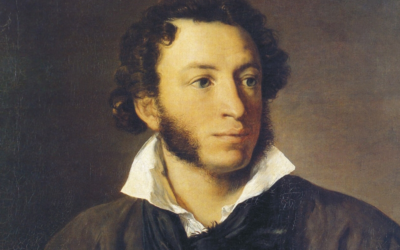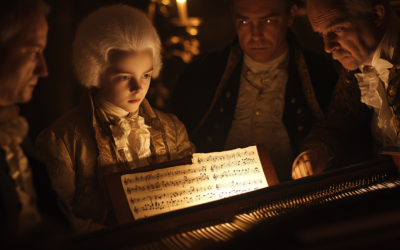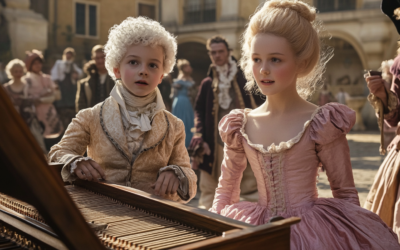Wolfgang Amadé Mozart
The Vienna Disaster: The Crumbling Facade of the Mozart Legend
The failure of La Finta Semplice in Vienna was a turning point for the Mozart family, revealing the cracks in the facade of Wolfgang’s prodigious reputation and prompting a desperate escape to Italy in search of redemption.
Mozart in Italy: The Untold Story
Was Mozart truly a solitary genius, or was he merely the instrument of his father’s ambition? “Mozart in Italy” challenges the conventional narrative, revealing a complex dynamic between father and son that shaped the course of music history. Prepare to question everything you thought you knew.
“Everyone in Vienna lamented that little Mozart was unable to compose the opera, or that it was so poorly executed that it could not be performed, or that it was his father, and not he, who had written the music”
Mozart in Italy
The story of Mozart’s early successes often overlooks the harsh reality of his and his family’s struggles, particularly during their time in Vienna. Far from the romanticized tales of a prodigious genius, the reality was one of disappointment, failure, and unmet expectations. This chapter in Mozart’s life serves as a stark reminder that not all was as it seemed behind the scenes.
The Humiliation of La Finta Semplice
In 1768, the young Wolfgang, at just twelve years old, was tasked with composing the opera La Finta Semplice (The Feigned Simpleton), a challenge that proved too great. Despite Leopold Mozart’s fervent efforts to present his son as a child prodigy, capable of remarkable feats, the opera was met with harsh criticism and suspicion. Many in Vienna believed that the music had not been composed by Wolfgang at all, but rather by his father, or that the work was simply too poor to be performed.
The opera was riddled with errors, particularly in its handling of the Italian language and prosody, which was crucial for opera. Words were mispronounced, syllables were misplaced, and the music itself was simplistic and repetitive, failing to meet the standards expected by the Viennese audience. The performers, unimpressed by the quality of the work, refused to stage it, leading to a complete collapse of the project. The impresario, Afflisio, known for being a shrewd and sometimes unscrupulous businessman, quickly recognized the deficiencies in the opera and refused to invest further in what he saw as a doomed venture.
The Fallout: A Tarnished Reputation
Leopold’s attempts to salvage the situation only made matters worse. Despite his desperate pleas and efforts to promote the opera, the Viennese court and public remained unconvinced. The involvement of Leopold in the composition became increasingly apparent, particularly in the detailed corrections and revisions he made to the score. This only further fueled the belief that Wolfgang was not the musical genius his father claimed him to be.
The failure of La Finta Semplice had significant repercussions. The Mozarts were not only humiliated in Vienna but also faced consequences back in Salzburg. Leopold’s reputation suffered greatly, with the Archbishop of Salzburg suspending his salary and expressing his displeasure at the whole debacle. The family’s future in Salzburg became uncertain, prompting Leopold to consider a drastic change.
The Italian Escape
Facing a hostile environment in both Vienna and Salzburg, Leopold decided that the only way to restore their fortunes was to leave Austria and embark on a tour of Italy, the heartland of music. He hoped that Italy would offer the opportunities and recognition that had eluded them in Vienna. With Wolfgang’s youth still an asset, despite his growing age, Leopold meticulously planned the trip, securing letters of recommendation and financial support.
However, the decision to leave Salzburg came at a cost. Nannerl, Wolfgang’s sister, and their mother were left behind, forced to live in relative obscurity while Leopold and Wolfgang pursued fame and fortune in Italy. The journey to Italy marked a turning point for the Mozart family, as they sought to escape the shadow of their failures and start anew.
You May Also Like
Mozart and the Nationalist Illusion: The 1931 Festival and Its Legacy
The Salzburg Festival, far from being a mere celebration of Mozart’s genius, was born out of nationalist ambitions during a turbulent period in Austro-German history. Conceived by figures like Max Reinhardt, Heinrich Damisch, and Friedrich Gehmacher, the festival was deeply rooted in ultranationalistic ideals, transforming Mozart’s legacy into a tool for cultural dominance. The truth behind its founding has long been obscured, but the primary sources tell a different, darker story.
K.6 and K.7 Sonatas: A Fabricated Genius?
The earliest sonatas of Wolfgang Amadeus Mozart, K.6 and K.7, are traditionally seen as proof of his precocious genius. But as we explore the murky origins of these works, we find that they may be more a product of Leopold Mozart’s ambition than Wolfgang’s musical talent. The truth, as always, lies somewhere between the notes.
Georg Nissen and the Missing Notebooks – Part II
This second part delves deeper into Georg Nissen’s scheme to expose the truth about Mozart’s death, and the roles of Constanze Mozart and her sons in keeping it buried. As new details emerge, the mystery surrounding the famous composer’s final days grows even darker, with powerful forces potentially at play.
Mozart and Salieri
Pushkin does not see Salieri as a mere mediocre. In fact, Salieri embodies the struggle of the artist, much like Michelangelo, who reaches greatness through relentless effort. Pushkin himself identifies with both Mozart and Salieri, but he emphasises that true art demands work, discipline, and sacrifice. In poisoning the Mozartian element within himself, Salieri performs a service to art, freeing it from the frivolity of effortless genius. ‘Can genius and malice coexist?’ Pushkin’s answer is complex, but in the end, Salieri’s act seems to affirm that true creation lies in the hands of those who strive.
The Fabrication of Genius
Leopold Mozart’s tireless efforts to promote his son Wolfgang as a child prodigy were rooted in manipulation, exaggeration, and a relentless drive for social success. Far from being a miraculous genius, Wolfgang was pushed into the spotlight by his father, whose grandiose claims often obscured the reality of his son’s abilities.
The Myth of Mozart
A critical examination of Wolfgang Amadeus Mozart’s life reveals a man shaped more by his father’s ambitions than by innate genius. Stripped of the myths, Mozart’s early years reflect a childhood dominated by relentless touring, inconsistent education, and a legacy built on exaggerated achievements. Discover the real story behind the legend.



